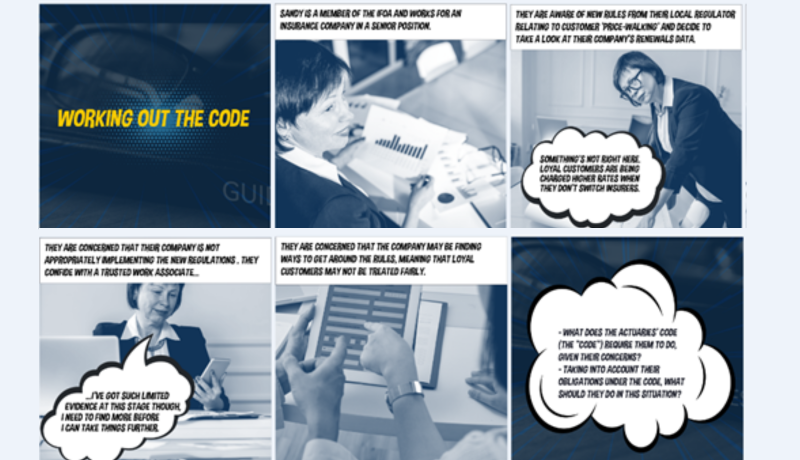
NEW: An Ethical Lens on Current Themes
Video Content

Funnels of Doubt
Mark, Emma, and Aileen are all actuaries working for a small insurance company. Mark and Emma worry about the effect of climate change on the planet and what changes they will see in their lifetimes. Aileen, their boss, is neutral on climate change personally, but sees it as yet another issue she has to consider when overseeing projects and running a busy actuarial team. Mark and Emma have been working on some scenarios for how the firm’s insurance business might be affected by climate change over the next 30years. Initially somewhat daunted by how to do the work, through their own research and some helpful external consultancy input, they have the results written up and ready to take to senior managers and the Board.

How Urgent is Urgent?
Richard is training Amy in the process of setting assumptions. Amy is keen to make an impact and has been inspired by some of the materials she has been reading about climate and wants to incorporate climate into the assumption setting process. Richard wants a data driven exercise and explains how the process is well established and disputes the statistical validity of Amy’s proposal.

The New World
Elise and Jeremy are actuaries in their 30s. Ex-colleagues and good friends, they stayed in contact via regular ‘Zoom’ catch ups when Jeremy moved to a different company three months ago. While Jeremy now works from home, Elise now does some days in the office each week. Each of them is having to adjust to new work patterns with the distinction between; what is work time and what is social time, becoming ever more blurred.

Diverse Minds
Sam, an actuary, is having an off day when his day starts badly with travel disruption and meetings are re-arranged at short notice. Allie is more sympathetic than other colleagues. However, the following day we see a different side to Sam when things have gone more smoothly. Allie values Sam’s amazing attention to detail and had asked Sam to check a report before it is submitted to a client. Sam, true to form, spots an error which was missed by his actuarial colleagues.
Mini Case Studies

A Breakdown of Communication
Sophia, an actuary, accepts an instruction from a solicitor acting in a divorce settlement to provide a pension report on behalf of a client. The timescale to conduct the work is particularly tight and, due to unforeseen circumstances beyond her control, Sophia exceeds the original deadline and sets a new one. All progresses well until Sophia becomes ill and misses the second deadline and her failure to communicate causes further issues.

Testing the Model?
Ethan has been asked to develop a model to analyse an extensive set of data, including data external to his firm, with a view to implementing prices for a new product. His firm believes that it has access to a volume of data which will give it a competitive edge and has tasked a team of specialist modellers consisting of data scientists and Ethan, to develop a market-leading set of prices. Although there is time to develop and test the model, Ethan has concerns that there is insufficient time to comply with key aspects of the Actuaries’ Code and TAS 100.

Working out the Code
Sandy is a Member of the IFoA and works for an insurance company in a senior position. They are aware of new rules from their local regulator relating to customer 'price-walking' and ‘loyal’ customers being charged higher rates when they do not switch insurers. They are concerned that their company is not appropriately implementing the new regulations and whilst at this stage they have limited evidence, they are concerned that the company may be finding ways to get around the rules, meaning that loyal customers may not be treated fairly.
Working out the CodeToolkit

Toolkit
Our Toolkit, which is designed to provide you with helpful tips and relevant and engaging content to help you to facilitate high quality, participative sessions for your colleagues.
Toolkit